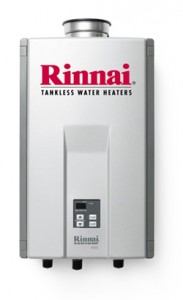 We talked about many of the benefits you can see from switching to a tankless water heater in a previous post, and since we know that many Atlanta plumbers are fielding questions about this upgrade a lot these days, we thought we’d give you the low-down on what you need to know when you decide to buy a tankless water heater and have it installed in your home.
We talked about many of the benefits you can see from switching to a tankless water heater in a previous post, and since we know that many Atlanta plumbers are fielding questions about this upgrade a lot these days, we thought we’d give you the low-down on what you need to know when you decide to buy a tankless water heater and have it installed in your home.
How Do Tankless Water Heaters Work?
In brief, tankless water heaters heat water directly without using a storage tank. Tankless water heaters can be either gas or electrically powered, but in both designs cold water travels through a pipe into the unit where it is heated immediately, then delivered to where it’s needed. Because of this design, tankless water heaters can deliver a constant supply of hot water, unlike traditional water heaters that are limited to heating as much water as can fit in their holding tank at one time.
Before You Buy
Before you decide to buy a tankless water heater, be sure to consider the following:
- The fuel type the water heater will use
- The location, size and demand that will be placed on the water heater
- The application or applications for which the water heater will be used
Fuel Type
The first decision you’ll need to make is between an electric tankless water heater and one that is gas-fired.
Electric
If you decide to go with an electric tankless water heater, you should consider the voltage, amperage and circuit breaker requirements carefully before buying.
- Many units will accommodate a variety of voltages, from 110V to 277V, and different models will have different requirements in amperage draw, so you’ll want to ensure that your home’s electrical system can handle the demands of the tankless water heater you decide to purchase.
- Ensure that you have a circuit or circuits available that can support the tankless water heater you buy – it may be necessary to place the water heater on its own dedicated circuit. Consult a qualified, licensed electrician to make sure you know the specifications of your home’s systems and can provide the tankless water heater with what it needs.
Gas-fired
If you decide to purchase a gas-fired water heater, there are gas type and venting requirements you’ll need to consider.
- Is your home’s gas type natural gas or propane? Make sure you know before purchasing any gas-powered appliances.
- Examine your gas line to ensure it will meet the requirements of your new gas-fired tankless water heater – they may exceed those of your existing tank-style water heater.
- Carefully consider the venting requirements and options for your home that a gas-fired appliance will require – this can be a complicated process, and building code requirements for your area may come into play, so feel free to give us a call. R.S. Andrews technicians can provide you with a full assessment of your situation and make sure you know all of your options before any installation begins.
That covers choosing a fuel type for your water heater – stay tuned later this week for Part 2 of the Tankless Hot Water Heater Buying Guide! We’ll be talking about understanding the application(s) for which your tankless water heater will be utilized, and go over some options for sizing and locating a tankless water heater in your home so you can ensure that it will operate efficiently and safely.
If you are interested in purchasing a tankless water heater and have any questions about your choices and what’s best for your home, just give R.S. Andrews a call – we’re always happy to answer any and all of your queries and provide purchase and installation estimates free of charge.
For more about tankless water heaters, check out Smiley’s blog post – “Does Waiting for Hot Water Get You Steamed? Go Tankless!“

